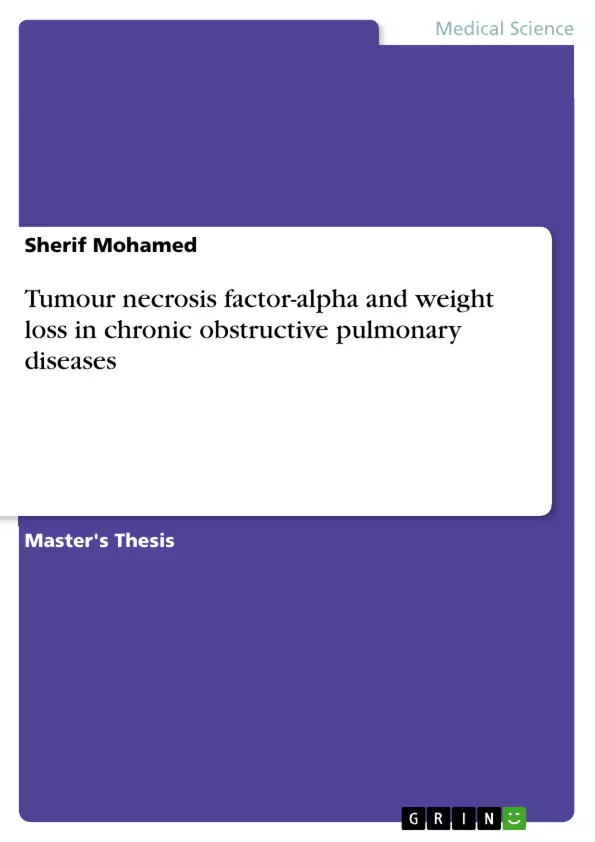Weight loss is a common feature in patients with chronic obstructive pulmonary disease (COPD). The clinical importance of weight loss; particularely loss of fat-free mass (FFM) has been demonstrated in its adverse effects on physical performance and quality of life. Moreover; weight loss and a low body weight are unfavorable prognostic factors in survival, independent of lung function.
Mechanisms of malnutrition in those patients are not fully understood. Several factors have been implicated. Increased resting energy expenditure (REE) contributes the main hypothesis for weight loss in COPD patients. However, not all patients with COPD who lose weight are hypermetabolic.
Recent data have shown that a systemic inflammatory response is present in patients with COPD. A clear evidence for a relationship between weight loss and plasma tumour necrosis factor-alpha (TNF-*) has been shown in COPD patients. TNF-* produces a cachexia-like syndrome in animal models and has been implicated as a mediator of cachexia in several clinical conditions including cancer, chronic heart failure, cystic fibrosis and anorexia nervosa.
Nutritional assessment for COPD patients is essential; to identify those individuals who will benifit from nutritional support therapies and to determine baseline values to measure the effectiveness of nutritional intervention. It includes several methods, no simple recommendation can be given regarding the best method for nutritional assessment.
Because of the negative impact of malnutrition on the respiratory system in COPD patients, contributing to morbidity and mortality; it's valuable to include management strategies that increase energy balance in order to increase weight and fat-free mass in those malnourished COPD patients.
The aim of this study is to determine the most valuable measurements to assess the nutritional status of COPD patients; as regards the anthropometric measurements, the somatic and visceral proteins and markers of inflammation; and to evaluate the correlation between serum TNF-* levels and weight loss among those patients; as a trial to improve their clinical prognosis and quality of life.
Inhaltsverzeichnis (Table of Contents)
- INTRODUCTION AND AIM OF WORK
- REVIEW OF LITERATURE
- Malnutrition in COPD patients
- Adverse effects of malnutrition in COPD patients
- Nutritional assessment
- Tumour-necrosis factor-alpha (TNF-α)
- Nutritional interventions in COPD patients
- PATIENTS AND METHODS
- RESULTS
- DISCUSSION
- SUMMARY AND CONCLUSION
- RECOMMENDATIONS
- REFERENCES
Zielsetzung und Themenschwerpunkte (Objectives and Key Themes)
This thesis examines the relationship between tumour necrosis factor-alpha (TNF-α) and weight loss in patients with chronic obstructive pulmonary diseases (COPD). The study aims to assess the prevalence of malnutrition in COPD patients and its adverse effects, explore the role of TNF-α in the pathogenesis of weight loss, and evaluate the effectiveness of nutritional interventions in improving nutritional status and clinical outcomes.
- Malnutrition in COPD patients
- Role of TNF-α in weight loss in COPD
- Nutritional assessment in COPD patients
- Impact of nutritional interventions on COPD patients
- Relationship between TNF-α and weight loss in COPD patients
Zusammenfassung der Kapitel (Chapter Summaries)
- INTRODUCTION AND AIM OF WORK: This chapter sets the context for the study, introducing the prevalence of COPD and its associated complications, particularly malnutrition. The chapter outlines the research question and specific objectives of the thesis.
- REVIEW OF LITERATURE: This chapter provides a comprehensive overview of the existing literature on malnutrition in COPD patients, exploring its prevalence, causes, and consequences. It also examines the role of TNF-α in the pathogenesis of weight loss and discusses different nutritional assessment methods and interventions.
- PATIENTS AND METHODS: This chapter describes the design, setting, and methodology of the study. It outlines the inclusion and exclusion criteria for participant selection, details the data collection methods, and provides a comprehensive overview of the procedures used to measure variables of interest.
- RESULTS: This chapter presents the findings of the study, analyzing the data collected from the participants. It explores the prevalence of malnutrition, the relationship between TNF-α and weight loss, and the effectiveness of nutritional interventions.
- DISCUSSION: This chapter interprets the study's findings in the context of previous research and relevant theoretical frameworks. It discusses the implications of the results, highlighting their strengths, limitations, and potential areas for further research.
Schlüsselwörter (Keywords)
Chronic obstructive pulmonary disease (COPD), malnutrition, weight loss, tumour necrosis factor-alpha (TNF-α), nutritional assessment, nutritional interventions, inflammatory cytokines, clinical outcomes.
Frequently Asked Questions
What is the link between COPD and weight loss?
Weight loss, especially the loss of fat-free mass, is common in COPD patients and is an unfavorable prognostic factor for survival and quality of life.
What role does TNF-alpha play in COPD?
Tumour necrosis factor-alpha (TNF-α) is an inflammatory marker. High levels are associated with a systemic inflammatory response and cachexia (severe weight loss) in COPD patients.
Why do some COPD patients lose weight even without being hypermetabolic?
While increased energy expenditure is a factor, systemic inflammation and mediators like TNF-alpha are believed to play a significant role in malnutrition and muscle wasting.
How is nutritional status assessed in COPD patients?
Assessment includes anthropometric measurements, evaluating somatic and visceral proteins, and measuring markers of inflammation like serum TNF-alpha levels.
Can nutritional interventions help COPD patients?
Yes, management strategies aimed at increasing energy balance can help malnourished patients increase their weight and fat-free mass, improving physical performance.
What are the adverse effects of malnutrition in respiratory health?
Malnutrition negatively impacts the respiratory system, contributing to increased morbidity, mortality, and reduced quality of life in chronic lung diseases.
- Citar trabajo
- Sherif Mohamed (Autor), 2001, Tumour necrosis factor-alpha and weight loss in chronic obstructive pulmonary diseases, Múnich, GRIN Verlag, https://www.grin.com/document/436353



